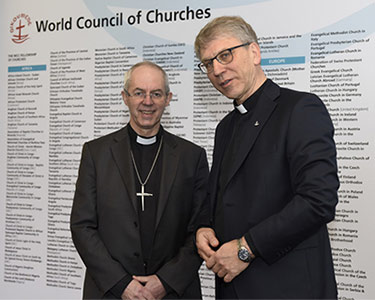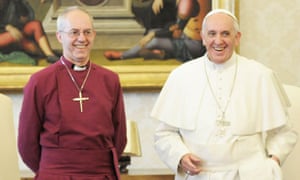Walking
Together in
the Spirit
.
70th
Anniversary of
the World
Council of
Churches
Ecumenical
Prayer Service
in Geneva on June
21 2018
.
.Reflection
given by Pope Francis
"Walk by the Spirit, and
do not gratify the desires of the
flesh...
Those who belong to
Christ Jesus have crucified the flesh
with its passions and desires. If we
live by the Spirit, let us also walk
by the Spirit."
- Galatians 5:16, 24-25
Dear brothers and sisters, today more than
ever the words of the Apostle Paul challenge
us. Walking in the Spirit means rejecting
worldliness. It means opting for a mindset of
service and growing in forgiveness. It means
playing our part in history but in God's good
time, not letting ourselves be caught up in
the whirlwind of corruption but advancing
calmly on the way whose signpost is the "one
commandment: 'You shall love your neighbour as
yourself"' (v. 14). The path of the Spirit is
marked by the milestones that Paul sets forth:
"love, joy, peace, patience, kindness,
generosity, faithfulness, gentleness and
self-control" (v. 22).
We are called, together, to walk along this
path. This calls for constant conversion and
the renewal of our way of thinking, so that it
can conform to that of the Holy Spirit. In the
course of history, divisions between
Christians have often arisen because at their
root, in the life of communities, a worldly
mindset has seeped in. First, self-concern
took priority over concern for Christ. Once
this happened, the Enemy of God and man had no
difficulty in separating us, because the
direction we were taking was that of the
flesh, not of the Spirit. Even some past
attempts to end those divisions failed
miserably because they were chiefly inspired
by a worldly way of thinking. Yet the
ecumenical movement, to which the World
Council of Churches has made so great a
contribution, came about as a grace of the
Holy Spirit (cf. Unitatis Redintegratio, 1).
Ecumenism made us set out in accordance with
Christ's will, and it will be able to progress
if, following the lead of the Spirit, it
constantly refuses to withdraw into itself.
It might be objected that to walk in this way
is to operate at a loss, since it does not
adequately protect the interests of individual
communities, often closely linked to ethnic
identity or split along party lines, whether
"conservative" or progressive". To
choose to belong to Jesus before belonging to
Apollos or Cephas (cf. 1 Cor 1:12); to belong
to Christ before being "Jew or Greek" (cf. Gal
3:28); to belong to the Lord before
identifying with right or left; to choose, in
the name of the Gospel, our brother or our
sister over ourselves... In the eyes of the
world, this often means operating at a loss.
Ecumenism is "a great enterprise operating at
a loss" But the loss is evangelical,
reflecting the words of Jesus: "Those who want
to save their life will lose it, and those who
lose their life for my sake will save it" (Lk
9:24). To save only what is ours is to walk
according to the flesh; to lose everything in
the footsteps of Jesus is to walk in the
Spirit. Only in this way does the Lord's
vineyard bear fruit. As Jesus himself teaches,
those who store up riches for themselves bear
no fruit in the Lord's vineyard, only those
who, by serving others, imitate the "mindset"
of God, who never stops giving, even to the
gift of his very self (cf. Mt 21:33-42). Such
is the mindset of Easter, which alone truly
bears fruit.
Looking at our own journey, we can see a
reflection of ourselves in some of the
experiences of the early communities of
Galatia. How difficult it is to overcome hard
feelings and to foster communion! How hard it
is to leave behind centuries-old disagreements
and mutual recriminations! It is even more
formidable to withstand the subtle temptation
to join others, to walk together, but for the
sake of satisfying some partisan interest.
This is not the "mindset" of the Apostle, but
that of Judas, who walked with Jesus but for
his own purposes. There is only one way to
shore up our wavering footsteps: to walk in
the Spirit, purifying our hearts of evil,
choosing with holy tenacity the way of the
Gospel and rejecting the shortcuts offered by
this world.
After so many years of ecumenical commitment,
on this seventieth anniversary of the World
Council, let us ask the Spirit to strengthen
our steps. All too easily we halt before our
continuing differences; all too often we are
blocked from the outset by a certain weariness
and lack of enthusiasm. Our differences must
not be excuses. Even now we can walk in the
Spirit: we can pray, evangelize and serve
together. This is possible and it is pleasing
to God! Walking, praying and working together:
this is the great path that we are called to
follow.
And this path has a clear aim, that of unity.
The opposite path, that of division, leads to
conflict and breakup. The Lord bids us set out
ever anew on the path of communion that leads
to peace. Our lack of unity is in fact "openly
contrary to the will of Christ, but is also a
scandal to the world and harms the most holy
of causes: the preaching of the Gospel to
every creature" (Unitatis Redintegratio,
1). The Lord asks us for unity; our world,
torn by all too many divisions that affect the
most vulnerable, begs for unity.
Dear brothers and sisters, I have desired to
come here, a pilgrim in quest of unity and
peace. I thank God because here I have found
you, brothers and sisters already making this
same journey. For us as Christians, walking
together is not a ploy to strengthen our own
positions, but an act of obedience to the Lord
and love for our world. Let us ask the Father
to help us walk together all the more
resolutely in the ways of the Spirit. May the
Cross guide our steps, because there, in
Jesus, the walls of separation have already
been torn down and all enmity overcome (cf.
Eph 2:14). In him, we will come to see that,
for all our failings, nothing will ever
separate us from his love (cf. Rom 8:35-39).
.

.'Ecumenical Spring':
Archbishop Justin Welby's speech at
World Council of Churches Center in
Geneva for 70th Anniversary, February
2018
One of the great gifts of
the ecumenical movement is that it has
allowed Christians from different
denominations, who might once have kept
separate from one another, to get to know
one another. There were times before, say,
the 1960s, when people of one denomination
might never have entered the church building
of another. Indeed many may have feared to
go in either for fear of either being turfed
out or, worse, contaminated by the place
itself. Then something changed. Christians
found common cause in all sorts of forums –
political life; spirituality and prayer;
community service; education; children’s
work...
In the early days of his pontificate, which
started two days before I took up my present
office, Pope Francis made several public
statements in which he used the metaphor of
the sheep, the shepherd and the sheepfold. I
had cause to look at these statements again
last year when I was invited to write a
reflection on them for a collection of
reflections on the words of Pope Francis.
The most famous of these statements was when
he exhorted the clergy, the pastors, to have
the ‘smell of the sheep’, so close were they
to their people, the flock. But in other
statements he spoke of the sheepfold as
being like the Church. His interesting take
on this is that as well as the traditional
understanding of the absolute need to go out
and seek the lost to bring them back into
the safety of the sheepfold, he saw that it
was possible for the sheepfold to be as a
frontier, a barrier – not only keeping out
the wolves but also other sheep.
The state of the Church today is such that
in many places – particularly in Europe – we
can see ninety-nine outside the fold and
only one inside. It’s almost true in
England: 1.7 percent of the population
attend the Church of England.
The task is great. It is appropriate, right
and imperative that the churches work
together to seek out the lost wherever they
may be. To find that when we bring them into
the safety of the fold should be one fold,
not many – and that the flock is one flock,
with one shepherd, the Good Shepherd
himself, who prays that we may be one.
top photo above:
Archbishop Justin Welby and Pope Francis
meet at the Vatican
bottom
photo: Archbishop Welby and WCC general
secretary Rev. Dr Olav Fykse Tveit - February
2018
|

